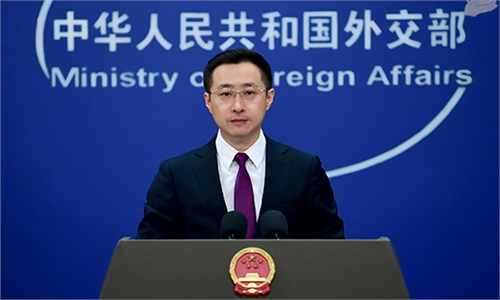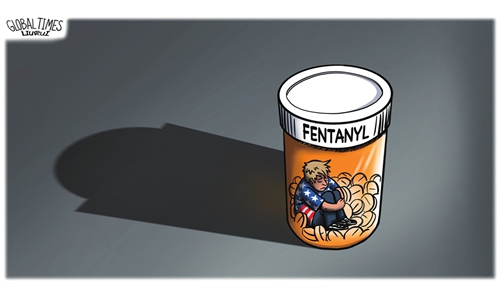Biden admin to hike tariffs on Chinese products in self-contradictory protectionist move after calling Trump’s tariff approach ‘a major mistake’
American importers, consumers to bear higher costs: expert

A customer shops at a supermarket in Arlington, Virginia, US on August 14, 2024. Photo: VCG
The Biden administration on Wednesday announced to increase tariffs on certain Chinese products, including solar cells and tungsten products, one day after US President Joe Biden called President-elect Donald Trump's tariff approach "a major mistake."
Chinese experts said that although the Biden administration criticized Trump's tariffs, it did not roll back the previous Trump-era tariffs imposed on Chinese products, showing its trade protectionism in nature.
The USTR office on Wednesday announced tariff increases under Section 301 for imports from China of certain tungsten products, wafers and polysilicon.
The rates for solar wafers and polysilicon will increase to 50 percent, and the rates for certain tungsten products will increase to 25 percent. These tariff increases will take effect on January 1, 2025, according to a statement released by the USTR office.
According to a report posted by the USTR office, the newly announced tariffs were a follow-up of a tariff increase package under the Section 301 investigation proposed in September.
The Biden administration has again contradicted its criticism of Trump and is making the same mistakes by hiking tariffs on some products from China, Li Yong, a senior research fellow at the China Association of International Trade, told the Global Times on Thursday.
"This is hilarious, and is a typical case of 'the pot calls the kettle black.' But at the same time, the Biden administration's tariff action is a demonstration of how double-tongued the outgoing administration can be when it comes to its own doing," said Li.
On Tuesday, Biden called Trump's tariff approach "a major mistake."
"On top of that, he (Trump) seems determined to impose steep universal tariffs on all imported goods brought to this country on the mistaken belief that foreign countries will bear the cost of those tariffs rather than the American consumer… I believe this approach is a major mistake. I believe we have proven that approach is a mistake over the past four years," Biden said, according to remarks published on the White House's website.
Back in 2019, Biden slammed then-President Trump's move to impose tariffs on $300 billion worth of Chinese imports, saying that "any freshman econ student could tell you that the American people are paying his tariffs," according to media reports.
"These tariffs, whether under Trump or Biden, are the result of politicians' wishful thinking. They claim this is to balance trade and increase employment, but in reality, the aim is to curb China's economic growth," said Li.
Li criticized the US' abuse of tariff measures, which completely ignores the widespread opposition of the industry and the impact on the economy. Both American consumers and businesses have already paid a high price for these measures.
The USTR office also posted in the Wednesday report opposition comments from interested persons. These comments express concerns that increased tariffs on Chinese tungsten products will increase production costs, exacerbate inflation, harm US competitiveness and decrease US market share. One comment encouraged USTR to take alternative actions to tariffs.
Comments opposing the tariff increases primarily assert limited availability of tungsten products outside of China, estimating that China accounts for approximately 80 percent of global tungsten reserves, and insufficient quantities available from third country sources, according to USTR report.
It is a general principle in international trade that tariffs are usually borne by importers. Both middlemen and direct consumers will ultimately bear the costs of production due to increased tariffs, He Weiwen, a senior fellow of the Center for China and Globalization, told the Global Times on Thursday, noting that although the Biden administration is aware of this, it still imposed tariff hikes.
Biden's tariff measures against Chinese products were intended to leave a "political legacy", which not only further damages the normal development of China-US economic and trade relations but also creates challenges for the incoming Trump administration, Li said.
Commenting on whether trade teams from China and the US have established communication after US President-elect Donald Trump's nomination of Howard Lutnick as Secretary of Commerce, and whether the US has made new remarks about Trump's plan to raise tariffs on all Chinese goods by an additional 10 percent, a spokesperson for the Chinese Ministry of Commerce (MOFCOM), said at a press briefing on Thursday that China has maintained close communication with the team from US Department of Commerce through the established bilateral communication mechanisms and is also open to engaging with the new US administration's economic and trade team.
China maintains its opposition to unilateral tariffs, He Yadong, the spokesperson of the MOFCOM said.
"We are committed to enhancing dialogue and cooperation with the US based on mutual respect, peaceful coexistence, and win-win collaboration, to effectively manage differences and promote the long-term stability and growth of bilateral economic and trade relations," He said.



